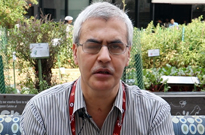
第27届亚太肝病学会年会(APASL2018)于昨日在印度新德里拉开帷幕,身为APASL2018主席,印度肝胆科学研究院BC Sharma教授有很多感触,他表示,这已经是APASL年会第三次在印度举办,印度对亚洲地区肝病的预防、治疗和知识传播做出了很大贡献,还先后组织了如门脉高压、静脉曲张出血、急性肝衰竭和乙型肝炎等专题会议,通过肝病学校、研究基金、奖励等,为亚洲地区培养了大量的肝病学家。
Sharma教授在肝性脑病的诊疗及研究方面颇有建树,在这次采访中,《国际肝病》也特意向他请教了肝性脑病预防和治疗的有关话题。
《国际肝病》:首先祝贺APASL2018的胜利召开,也对印度近年来为亚太地区肝病学发展所作出的贡献表示感谢。您身为大会主席,想必有很多感想。能否与我们分享一二?
Sharma教授:欢迎大家来参加在新德里召开的第27届亚太肝病学会年会。这已经是APASL年会第三次在印度举办,印度对亚洲地区肝病的预防、治疗和知识传播做出了很大贡献,还先后组织了如门脉高压、静脉曲张出血、急性肝衰竭和乙型肝炎等专题会议,通过肝病学校、研究基金、奖励等,为亚洲地区培养了大量的肝病学家。
Dr Sharma: Welcome to the 27th Asian Pacific Association for the Study of the Liver Annual Conference in New Delhi. This is the third time the conference has been organized in India. India has contributed a lot to prevention, treatment and spreading knowledge of liver disease across Asia. In alternate years, India organizes a single-topic conference on relevant issues in liver disease like portal hypertension, variceal bleeds, acute-on-chronic liver failure, and hepatitis B. India trains a lot of hepatologists in Asia through Schools of Hepatology, through fellowships, and offering awards to our Asian colleagues in the field.
《国际肝病》:哪些患者应该考虑进行肝性脑病的一级预防?如何进行?
Sharma教授:肝性脑病是肝硬化患者的常见问题。一旦发生,死亡率很高,所以最好采取预防措施以防止肝性脑病的发生。一级预防是预防肝性脑病的第一次发作。二级预防指患者从肝性脑病发作中恢复后,就立即采取措施防止复发。由于肝性脑病与高发病率和死亡率有关,伴随着高昂的医疗费用和支出,因此一级预防是非常重要的。我们通常选择那些更容易出现脑病的患者进行一级预防,如晚期肝病患者、有胃肠道出血的患者或发生感染的肝硬化患者。
Dr Sharma: Hepatic encephalopathy is a very common problem in patients with liver cirrhosis. Once it develops, it is associated with very high death rates, so it is always better to take preventive measures to prevent the development of hepatic encephalopathy. Primary prevention means preventing the first episode of hepatic encephalopathy. Secondary prevention means that once a patient has recovered from an episode of hepatic encephalopathy, measures are taken to prevent a recurrence. Primary prevention is very important because hepatic encephalopathy is associated with a high morbidity and mortality, as well as high costs and expenditure. For primary prevention, we select patients who are more prone to encephalopathy, such as those with advanced liver disease, patients with gastrointestinal bleeds, or patient with infections with their cirrhosis.
《国际肝病》:肝性脑病的二级预防需要注意什么?
Sharma教授:为避免肝性脑病复发,患者应该采取高蛋白饮食并继续使用乳果糖和益生菌治疗。坚持治疗是非常重要的。一旦患者停止治疗并且肝性脑病复发,未来肝性脑病进一步发作和死亡率的风险均增加。
Dr Sharma: To avoid relapses, patients should have a high protein diet and ongoing therapy with lactulose and probiotics. Compliance is very important. Once a patient stops therapy and has a recurrence, the risk of further episodes of hepatic encephalopathy and mortality are increased.
《国际肝病》:您觉得轻微肝性脑病患者诊断后应该常规予以治疗吗?治疗的终点是什么?
Sharma教授:轻度的肝性脑病应该治疗,治疗终点就是轻微型肝性脑病(MHE)得到改善。治疗的原因是可以提高生活质量,预防明显型肝性脑病的发生,改善肝硬化患者的生存。
Dr Sharma: Mild hepatic encephalopathy should be treated and the endpoint should be an improvement in minimal hepatic encephalopathy (MHE). It should be treated because it improves quality of life, prevents the onset of overt hepatic encephalopathy, and also improves survival in patients with liver cirrhosis.
《国际肝病》:您如何看待炎症在肝性脑病发病中的作用以及抗炎治疗对肝性脑病的价值?
Sharma教授:各种研究表明炎症,尤其是大脑的神经炎症,在肝性脑病的发展中起着重要作用。细胞因子和炎症标志物大量参与了肝性脑病的发展。抗炎药物的动物模型研究已有开展,结果显示对肝性脑病的预防和治疗均具有一定的应用价值。然而,我们无法在人体上试验抗炎药物,因为这些药物有肝脏毒性。肝硬化患者很容易发生肝脏毒性损伤,因此许多抗炎药物无法用于人类。
Dr Sharma: Various studies have shown that inflammation plays an important role, and specifically neuroinflammation in the brain plays a role, in the development of hepatic encephalopathy. There is a large contribution of cytokines and inflammatory markers to the development of hepatic encephalopathy. Anti-inflammatory drugs have been tried in animal models and found to be useful in the prevention and treatment of hepatic encephalopathy. However, in humans, we cannot try anti-inflammatory drugs because they are associated with liver toxicity. Patients with cirrhosis are prone to liver toxicity, so many anti-inflammatory drugs cannot be used in humans.